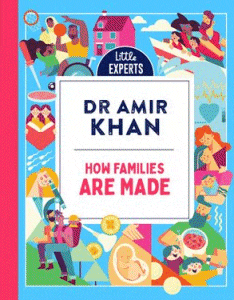
How Families Are Made
How Families Are Made
Dr Amir Khan
Donough O’Malley
Farshore, 2024
32pp., hbk., RRP $A19.99
9780008520885
No matter what the size or shape of your family – mum, dad and siblings; two mums; two dads; foster parents; single parent; several generations – each person in the family started out the same way – “a group of special cells, and these were created when an egg was fertilised by a sperm.”
Not so long ago when a parent was asked the inevitable “Where did I come from?”, the answer was to do with a stork or the cabbage patch; more recently seminal texts like Where Did I Come From? and What’s Happening to Me? caused outrage when they appeared on library shelves in primary schools, and just weeks ago a Sydney council tried to ban a book about same-sex parents from its shelves. So while the question remains as old as humanity, responses to it are gradually veering more and more towards the truth and reality, and in this new addition to the Little Experts series, the facts about reproduction, gestation and birth are given in both accessible text and clear illustrations while acknowledging that diversity in family structure and that “family” is much more than a coupling of male and female. It includes a glossary that explains terms like “foster parents”, “gender identity” and “transitioning” in the same way it does “embryo” and “zygote”, thus normalising their meaning and use for all children.
Despite the world, in general, having come a long way in acknowledging and accepting different family structures and the right for children to know the truth of their origins, including their biological beginnings, there are still those who find such topics too sensitive to discuss and so books like these must be in any school library collection. Yes, there will be those who giggle or blush but that, in itself, is part of their maturing and IMO, the more information young people have the more likely they are to develop respectful relationships with those around them.
Written by a qualified GP, well-known on television in the UK, and presented in such an objective manner amongst a collection of books that covers everything from vehicles powered by humans to superhero animals, it presents this topic as as natural and ordinary and everyday as it should be. However, there will be those for whom the matter-of-factness may clash with their school’s beliefs or ethics about the provision of such information, so, for them, a preview may be wise.